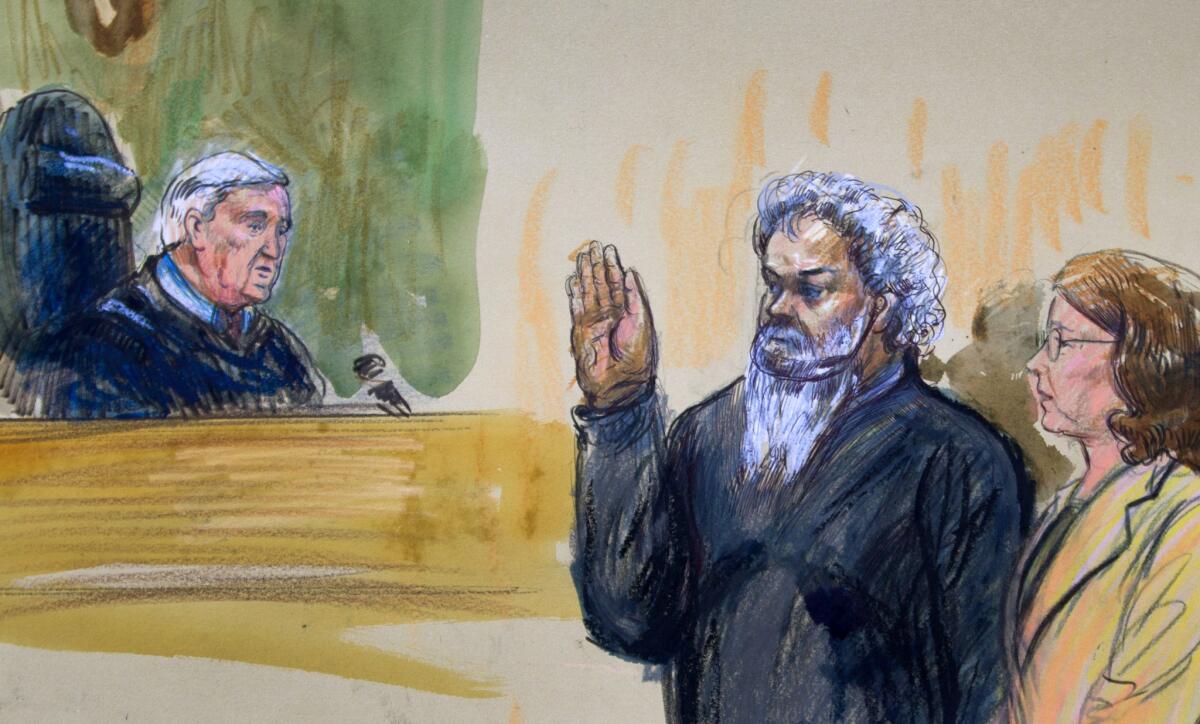Alleged ringleader in 2012 Benghazi terror strike denied bail

- Share via
Reporting from Washington — The alleged ringleader of the 2012 attack against a U.S. mission in Benghazi, Libya, was denied bail Wednesday as his court-appointed attorney complained that prosecutors had failed to provide concrete evidence of his direct involvement in the raid that left four Americans dead, including the U.S. ambassador.
Ahmed Abu Khatallah, dressed in a dark green jumpsuit, sat silently during the hearing in federal court a few blocks from the Capitol, listening to an Arabic translation of the proceeding. He was captured by the U.S. in Benghazi on June 15 and is being held in Alexandria, Va., as he awaits criminal trial.
Michael DiLorenzo, an assistant U.S. attorney in the District of Columbia, told Magistrate Judge Deborah A. Robinson that Khatallah’s continued detention was necessary to ensure that he appeared in court.
To bolster their case, prosecutors released new details Tuesday about Khatallah’s alleged role in the Sept. 11, 2012, attack that killed U.S. Ambassador J. Christopher Stevens and three other Americans.
Officials cited Khatallah’s alleged hatred of the U.S., his complaints before the attack about the presence of an American facility in Benghazi, his links to known terrorist groups and his fear of U.S. retaliation after the attack.
Defense attorney Michelle Peterson said that her client’s detention was appropriate at this time, but that there was an “utter lack of evidence” in the case.
U.S. officials promised to provide additional evidence, including video clips. But legal experts said prosecutors probably were withholding some details because of security concerns, releasing only enough to ensure that Khatallah can continue to be held.
Khatallah has pleaded not guilty to charges of providing material support and resources for a terrorist attack. A conviction on those counts could lead to life in prison. Prosecutors have said they may file additional charges that carry the death penalty.
Carl Tobias, professor at the University of Richmond School of Law in Virginia, predicted that much of the information related to the case would be kept secret from the public and Khatallah’s defense.
“There are all kinds of difficult questions in this case,” he said. “What’s under seal? What’s not publicly available? What’s a security risk? … We can anticipate that the government is likely to raise national security concerns throughout the case, from here on out. And so I think that’s going to be a critical difficulty.”
U.S. officials accuse Khatallah of being a senior commander for a faction of the extremist militia group Ansar al Sharia, which holds anti-Western views and advocates sharia, or Islamic law.
After the Benghazi attack, Khatallah increased his personal security in fear of U.S. retaliation, officials said. He also took steps to avenge the capture of a Libyan fugitive last year and was planning to launch other attacks against U.S. interests, according to prosecutors’ court filing.
When he was captured, prosecutors say, Khatallah was carrying a loaded firearm, a “further indication of his proclivity for violence.”
Peterson countered that it was not surprising for Khatallah to be armed given the state of unrest in Libya.
marianne.levine@latimes.com
More to Read
Sign up for Essential California
The most important California stories and recommendations in your inbox every morning.
You may occasionally receive promotional content from the Los Angeles Times.













